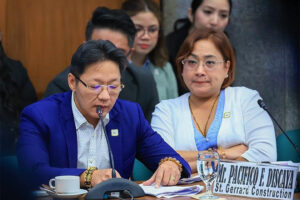THE Independent Commission for Infrastructure (ICI) on Wednesday confirmed that two controversial government contractors, Pacifico F. Discaya II and his wife Cezarah Rowena C. Discaya, will no longer cooperate with its ongoing investigation into alleged anomalies in government flood control and infrastructure projects.
ICI Executive Director Brian Keith F. Hosaka said that the couple, following their counsel’s advice, invoked their right against self-incrimination during their third hearing before the commission.
“Upon the advice of their counsel, they invoked their right to self-incrimination and manifested they will no longer cooperate with the investigation being conducted by the ICI,” Mr. Hosaka told reporters in a press briefing.
“They were thinking that when they cooperate before the ICI they will be getting a favorable recommendation from the commission as state witness,” he added.
The Discayas’ withdrawal comes after they had previously requested a one-week reset of proceedings to retrieve documents sought by the commission. The couple reportedly decided to pull out during Wednesday’s hearing after learning, through a recent interview conducted by journalist Karen Davila with ICI Commissioner Rogelio “Babes” L. Singson, that the commission had not yet recommended any individual for state witness status.
“They said that there was a statement by Commissioner Singson regarding his own personal take, his opinion, that as of now, no witness or no person who may be recommended by the commission as state witness,” Mr. Hosaka said.
Because of this the Discayas decided not to appear in future proceedings, he added.
The Discayas are key figures in the ongoing flood control and infrastructure investigations, overseeing nine firms that collectively secured about P77.9 billion in Department of Public Works and Highways (DPWH) flood control projects.
Public Works Secretary Vivencio B. Dizon said earlier that potential penalties for alleged bid rigging and contract manipulation across more than 1,200 projects from 2016 to 2025 could reach P300 billion.
Assistant Ombudsman and spokesperson Jose Dominic F. Clavano IV, said the couple move was “misguided.”
“Cooperation with the government is their only option right now. It will serve the public’s interest as well,” he told reporters via a Viber chat.
Despite the Discayas’ withdrawal, the commission assured that its investigation will continue, noting that the testimonies and affidavits the couple submitted during earlier hearings have already provided significant material for the case build-up.
“We still have many sources of information. In fact, many have already testified, and by connecting all of these, we will be able to determine what really happened and recommend filing cases against those responsible,” Mr. Hosaka said.
Meanwhile, the Department of Justice on Wednesday said it had already approved the ICI’s second request, dated Oct. 13, to issue immigration lookout bulletin orders against 16 additional individuals allegedly connected to an alleged kickback scheme involving flood control projects.
Also on Wednesday, the Department of Public Works and Highways (DPWH) has signed a memorandum of agreement with the Insurance Commission (IC) to enhance monitoring, and validation of infrastructure projects amid the ongoing flood control project scandal.
“This signing of this agreement between IC and the DPWH establishes a data-sharing framework that enables closer monitoring, validation, and more importantly, the enforcement of security in procurement of projects,” Public Works and Highways Secretary Vivencio B. Dizon said in a press briefing on Wednesday.
According to the agency, the partnership targets to enable facilitation of security in favor of the government, the performance and surety bonds of contracts tied to anomalous flood control projects.
Mr. Dizon said that with the establishment of the agreement this would allow the government to claim up to 30% of the contract value of the projects found to be anomalous by also securing bonds for procurement of the projects.
This agreement would also allow faster and easier claiming of bonds, Mr. Dizon said.
The agency earlier partnered with Blockchain Council of the Philippines (BCP) for the development of blockchain digital ledger to monitor foreign-assisted infrastructure projects. — Erika Mae P. Sinaking and Ashley Erika O. Jose
